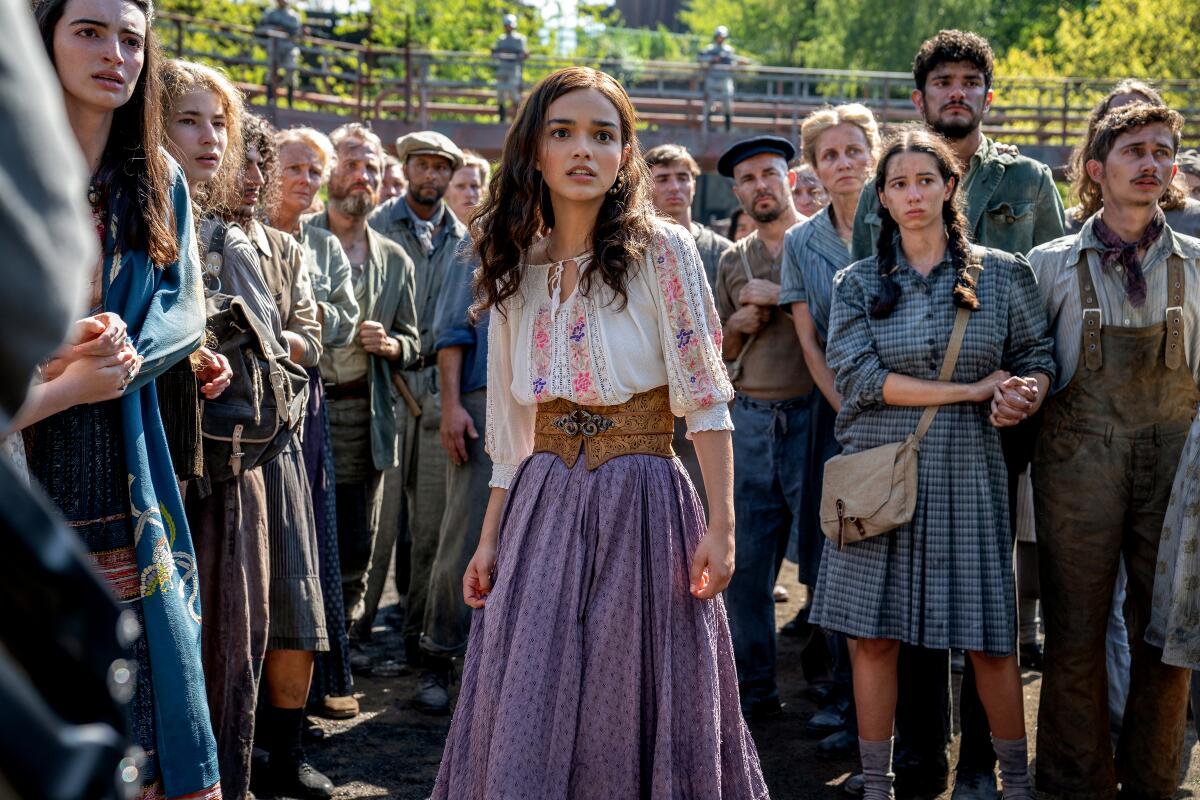‘Hunger Games: The Ballad of Songbirds & Snakes’ feels rushed on its way to fascism

- Share via
It’s been eight years since the release of the last “Hunger Games” film, “The Hunger Games: Mockingjay — Part 2,” which means enough time has passed that it feels appropriate to return to the well that produced big box-office dollars for Lionsgate, and made Jennifer Lawrence a household name. It also helps that author Suzanne Collins released a prequel novel in 2020, “The Ballad of Songbirds and Snakes,” which explores the young adult life of Coriolanus Snow, the future tyrannical president of Panem (played by Donald Sutherland in the films).
There is something comforting about slipping back into the world of Panem, dystopian and brutal as it is, especially in the capable hands of director Francis Lawrence, who helmed three out of four “Hunger Games” films: “Catching Fire” and both “Mockingjay” installments. He is a true craftsman and an audacious visual stylist, bringing a Cold War Soviet flair to the Panem of 64 years before Katniss Everdeen.
The movie invites viewers to learn more about the background of Coriolanus, played here by Tom Blyth, and to witness the early days of the Hunger Games, in which the spectacle of children killing each other for sport is wielded as a tool of propaganda.
Though the games have already been happening for a decade in the era of “Songbirds,” the film follows the addition of mentors for the young tributes, here culled from the top students at a wealthy academy in the Capitol. Coriolanus is the orphan scion of an aristocratic family who lost everything in the war: He lives in a crumbling, formerly spectacular apartment with his declining grandmother and his cousin Tigris, played by a wonderful Hunter Schafer, who is unfortunately relegated to the house for almost the entire movie.
Corio, as he’s nicknamed, strives to be the best and keep up appearances. When a cash prize is on the line for being the best mentor, he throws himself into the task, gaining the trust of his tribute, a fiery, spirited young woman from District 12: a folksy songstress named Lucy Gray Baird (Rachel Zegler).

The film is essentially the “Star Wars” prequels of the “Hunger Games” world, as we watch Coriolanus turn from idealistic young man to power-hungry sadist, in the same way we watched Anakin Skywalker become Darth Vader. But while George Lucas took three movies to show us Anakin’s fall into darkness, Lawrence and screenwriters Michael Lesslie and Michael Arndt try to do it in one overstuffed installment.
There is one pretty good “Hunger Games” movie here, the first 95 minutes. Sure, it’s a bit predictable and overwrought, but the style is great, the characters are engaging, and Viola Davis and Jason Schwartzman devilishly devour the scenery as Dr. Volumnia Gaul, Head Gamemaker, and Lucretius “Lucky” Flickerman, the first television host of the Games. Then the bad section starts.
After we’ve watched an entire bloody Hunger Games unfold, the audience then has to follow Coriolanus to District 12 where he’s been banished to work as a Peacekeeper. Then we have to witness his turn from lovesick young man to right-wing Panem fascist. The character beats simply don’t track, and it’s exhausting to even try to follow them.
It feels like a sequel movie that’s been hastily tacked on, with a distinctly different look and feel, set in the retro-industrial Appalachia of District 12, and the characters in completely different psychological mind-sets. As a book adaptation, it makes sense, but as film storytelling, it does not work, and it’s unfortunate that these aren’t two different movies.
The good news is that Blyth is terrific, delivering a star-making performance as Coriolanus. The issues with his character shifts are never about what he does on screen, but failures of writing, or perhaps hastily-excised scenes that would have helped to understand him more. Zegler cements her charm in a role that plays to her vocal strengths — her bluegrass performances are incredibly appealing. There’s so much that works about “The Hunger Games: The Ballad of Songbirds & Snakes,” it’s unfortunate that it’s all been crammed into one overly-long film.
Katie Walsh is a Tribune News Service film critic.
'The Hunger Games: The Ballad of Songbirds & Snakes'
Rating: PG-13, for strong violent content and disturbing material
Running time: 2 hours, 37 minutes
Playing: In wide release
More to Read
Only good movies
Get the Indie Focus newsletter, Mark Olsen's weekly guide to the world of cinema.
You may occasionally receive promotional content from the Los Angeles Times.










